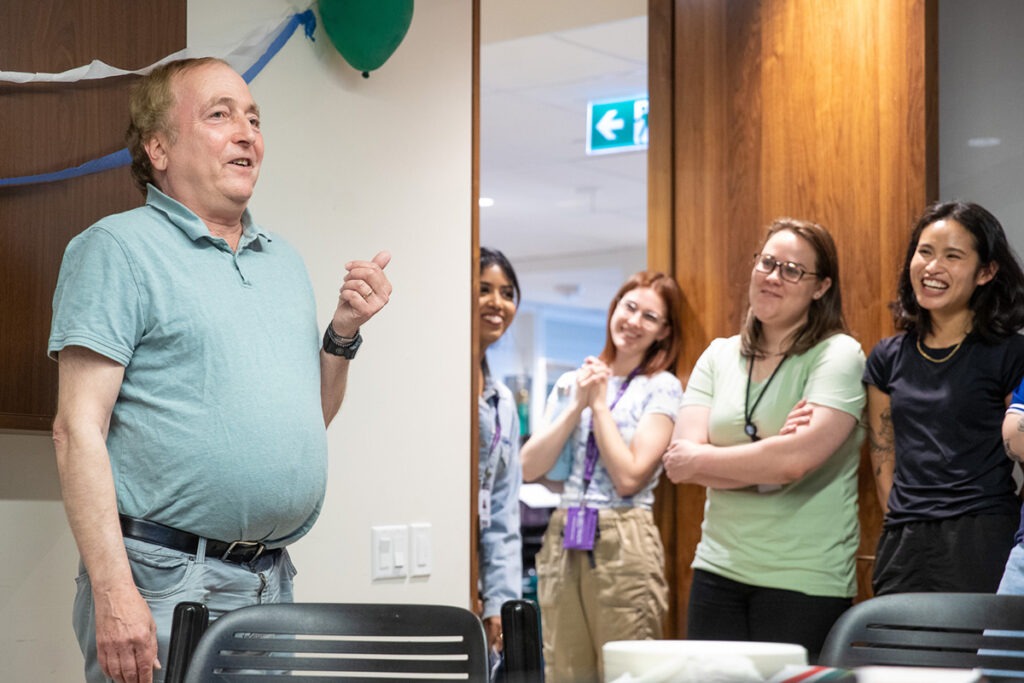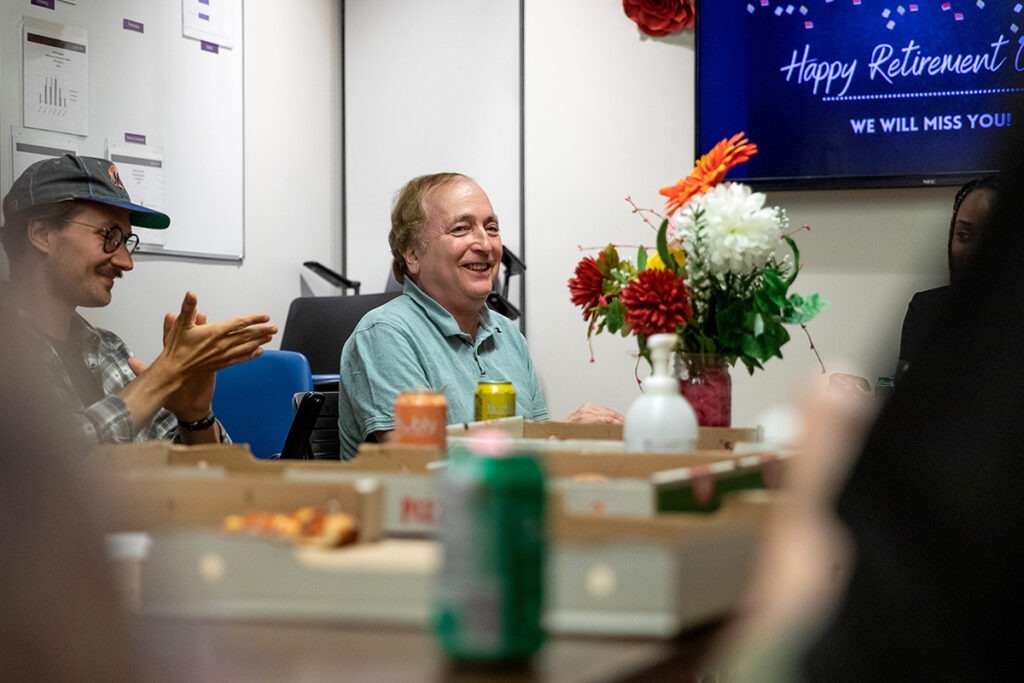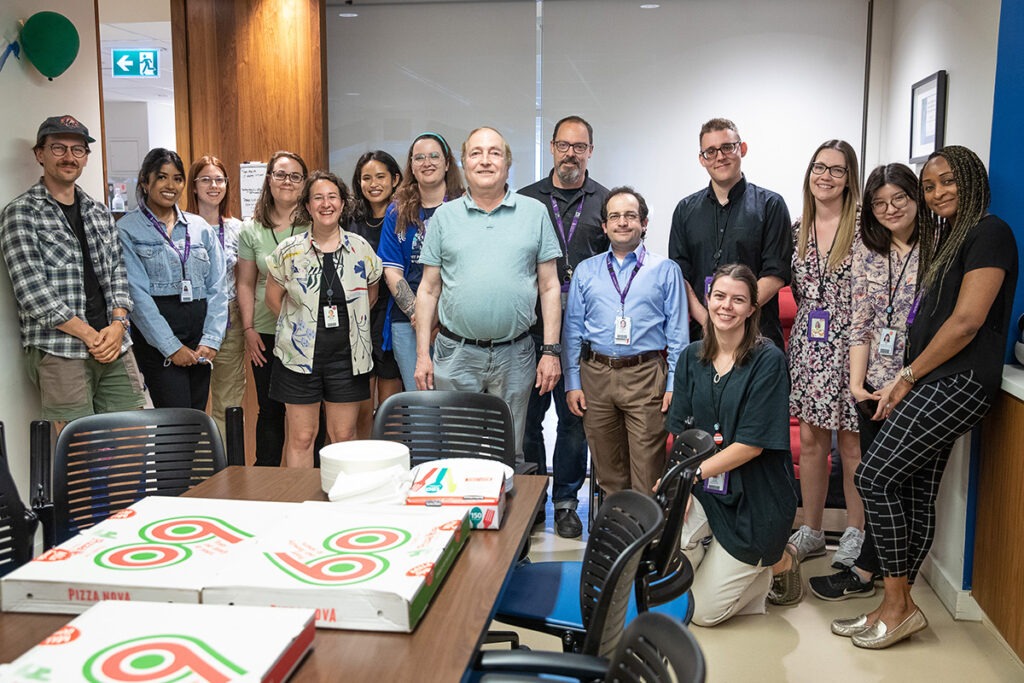Unity Health’s longest-serving peer support worker retires

After nearly a quarter-century, Gord Singer, the longest-serving peer support worker at Unity Health Toronto, is ready for retirement — even if a part of him will always remain in the job.
“I’m feeling happy about having dedicated so much time to a job that I value so much,” Singer said at his retirement celebration last month. “In my heart, I’ll always be at Unity Health.”
Singer, known as a “rock” among his colleagues at the St. Michael’s mental health program, was one of the first peer support workers in Ontario, spending his career helping clients progress in their recovery. Today, peer support workers are embedded in mental health programs throughout the province, using their lived experience to guide care and help patients navigate the health-care system. Singer was one of the first.
“He’s been a trailblazer,” says Dr. Matthew Levy, a psychiatrist who worked closely with Singer. “He’s had a really incredible impact on so many people throughout his years. And he’s been an amazing mentor to peer support workers.”
Singer’s official role at St. Michael’s began in 1999, when he was encouraged by Nicole Kirwan, a registered nurse whom he worked with, to apply for a newly-created peer support worker position at the hospital. The peer support worker would be an individual with lived experience who would provide practical and emotional support for other people with mental illness.
“I thought, ‘Could I really? Would I be able to help someone who’s going through such a hard time?’” Singer says, recalling his thought process when he was told about the position. “And then I thought, ‘I should give it a try. It’ll be a chance to really use what’s happened to me to try to help others.’”

Singer has schizophrenia, a diagnosis he says doctors were reluctant to give when he was diagnosed in 1975 because they regarded it as “hopeless.”
For years he experienced frequent psychotic episodes, heard mean voices in his head and was in and out of the hospital.
Despite these difficulties, Singer always maintained hope for himself, and he eventually found a medication that helped to manage his symptoms.
As his health improved, he was invited to be part of multiple advisory boards to share his patient perspective, invited to be on various health-care committees, and worked at CAMH to help implement a patient advisory group.
All of these experiences led to his role as a peer support worker at St. Michael’s, where Singer was determined to go above and beyond to help others.
In addition to his daily work supporting clients (from being a shoulder to cry on for someone dealing with a crisis to helping someone open a bank account), Singer has spent decades advocating for and changing the outlook on patients with mental illness.
“When I started my work, we never heard the word ‘recovery,’” he says. Having experienced recovery in his own life though, Singer endeavoured to change the narrative.
Through his interactions with colleagues and clients at work, his speaking engagements and volunteer opportunities, and the example he sets every day, Singer’s colleagues say he’s helped shape a culture of recovery and hope.
“He’s kind of an inspiration for all of our patients who are much earlier in the journey,” says Kirwan, who worked with Singer throughout his entire career. “Patients might say, ‘I’ll never get better. I’ll never have work. I’ll never get married.’ And Gord did all of those things.”

She says he embodies Unity Health energy, a sentiment that his interim manager, Jeanie Kang, echoes.
“Some of our clients in the community are very challenging, but it doesn’t matter who he’s working with. He’s always very patient and very compassionate,” says Kang, noting that the team could always count on him to provide a positive outlook when times were tough.
Laughing, she says that at most Singer might’ve said, “This is challenging,” then he’d proceed to find the bright side in the toughest of situations. In terms of dependability and positivity, she refers to Singer as the “pillar” of the team.
Now Singer says he wants to focus on relaxing and spending more time with his wife and dog — a stark contrast to the life doctors expected him to have when he received his diagnosis.
“I’m happy with my life,” says Singer. “I’ve had a chance to travel to different places. I’ve done a lot of public speaking and gone to conferences.”
And while Kirwan, Levy and Kang all say that they’ll miss Singer and that Unity Health won’t be the same without him, they’d be happy to know that he’ll still be around.
Singer plans to volunteer on mental health-focused boards and committees in his retirement.
By: Kaitlin Jingco
